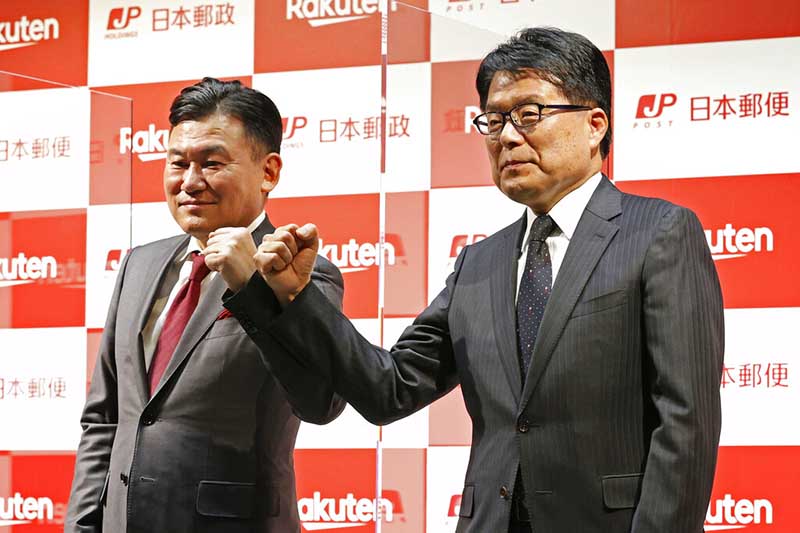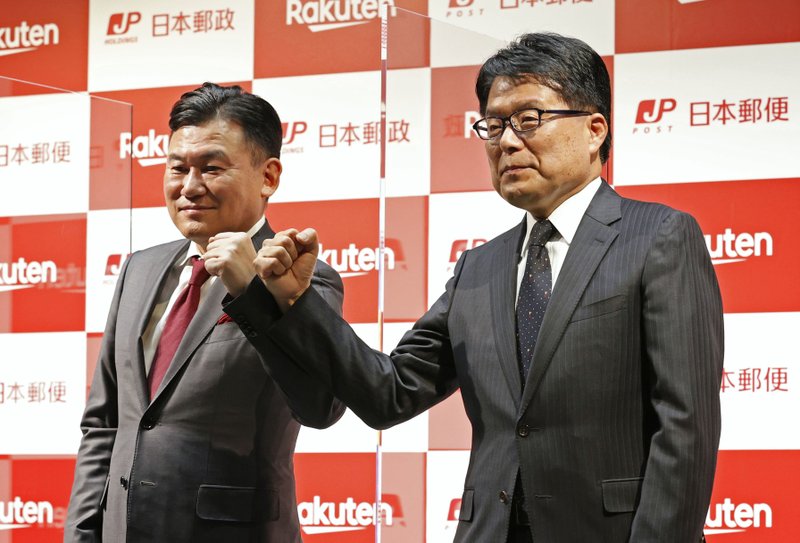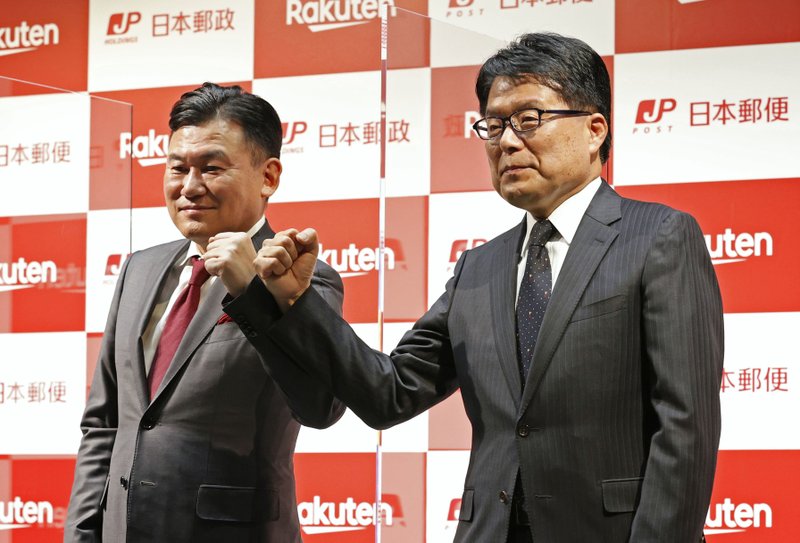

Japan’s postal system is investing 150 billion yen ($1.4 billion) in an 8% stake in the e-commerce venture Rakuten to strengthen a partnership in deliveries, fintech and other areas.
Rakuten’s shares shot up 8.6% in Tokyo trading Friday on news of the tie-up with Japan Post. Japan Post’s gained 4.9%.
Japan Post Holdings President Hiroya Masuda said Friday that the deal brought together “the digital and the real.”
The cooperation between the old-style analog mail and Rakuten, founded in 1997 and having 70 digital businesses, was announced earlier. It includes delivery services that allow people to make online reservations to pick up packages and mail in various locations whenever they want, both sides said.
The post office will gain technology advice and personnel from Rakuten. In return, Rakuten can use the post office’s network throughout the nation to sell its mobile service at real-life counters. Up to now subscriptions were mostly taken online.
Cashless payments are another area for possible cooperation. The Japanese post office is one of the biggest banking institutions in the country, holding more than 181 trillion yen ($1.7 trillion) in individual savings.
The shift to digital has been relatively slow in Japan compared to some Western nations, but it is picking up.
Introducing more digital technologies will help the post office deal with the labor shortages that plague many Japanese businesses.
Rakuten lags Amazon in the Japanese market and globally and is eager to expand. The Japanese company racked up a 114 billion yen ($1 billion) loss in the fiscal year through December, hurt by some costly investments.
In a report last month, Hiroko Sato, an analyst for Jefferies, noted Rakuten’s losses partly reflect costs of investments in its mobile infrastructure. She said “a steady trend” of growth could be expected for its financial businesses, with Rakuten already holding 20% market share in the cashless payment sector in Japan.
Rakuten’s CEO Hiroshi Mikitani said he hopes working with the post office will help “empower” rural economies and “turn a new page” for Japanese industries.
“We are becoming family,” he said.
___
Yuri Kageyama is on Twitter: https://twitter.com/yurikageyama

Japan’s postal system is investing 150 billion yen ($1.4 billion) in an 8% stake in the e-commerce venture Rakuten to strengthen a partnership in deliveries, fintech and other areas.
Rakuten’s shares shot up 8.6% in Tokyo trading Friday on news of the tie-up with Japan Post. Japan Post’s gained 4.9%.
Japan Post Holdings President Hiroya Masuda said Friday that the deal brought together “the digital and the real.”
The cooperation between the old-style analog mail and Rakuten, founded in 1997 and having 70 digital businesses, was announced earlier. It includes delivery services that allow people to make online reservations to pick up packages and mail in various locations whenever they want, both sides said.
The post office will gain technology advice and personnel from Rakuten. In return, Rakuten can use the post office’s network throughout the nation to sell its mobile service at real-life counters. Up to now subscriptions were mostly taken online.
Cashless payments are another area for possible cooperation. The Japanese post office is one of the biggest banking institutions in the country, holding more than 181 trillion yen ($1.7 trillion) in individual savings.
The shift to digital has been relatively slow in Japan compared to some Western nations, but it is picking up.
Introducing more digital technologies will help the post office deal with the labor shortages that plague many Japanese businesses.
Rakuten lags Amazon in the Japanese market and globally and is eager to expand. The Japanese company racked up a 114 billion yen ($1 billion) loss in the fiscal year through December, hurt by some costly investments.
In a report last month, Hiroko Sato, an analyst for Jefferies, noted Rakuten’s losses partly reflect costs of investments in its mobile infrastructure. She said “a steady trend” of growth could be expected for its financial businesses, with Rakuten already holding 20% market share in the cashless payment sector in Japan.
Rakuten’s CEO Hiroshi Mikitani said he hopes working with the post office will help “empower” rural economies and “turn a new page” for Japanese industries.
“We are becoming family,” he said.

Japan’s postal system is investing 150 billion yen ($1.4 billion) in an 8% stake in the e-commerce venture Rakuten to strengthen a partnership in deliveries, fintech and other areas.
Rakuten’s shares shot up 8.6% in Tokyo trading Friday on news of the tie-up with Japan Post. Japan Post’s gained 4.9%.
Japan Post Holdings President Hiroya Masuda said Friday that the deal brought together “the digital and the real.”
The cooperation between the old-style analog mail and Rakuten, founded in 1997 and having 70 digital businesses, was announced earlier. It includes delivery services that allow people to make online reservations to pick up packages and mail in various locations whenever they want, both sides said.
The post office will gain technology advice and personnel from Rakuten. In return, Rakuten can use the post office’s network throughout the nation to sell its mobile service at real-life counters. Up to now it has only taken subscribers online.
Cashless payments are another area for possible cooperation. The Japanese post office is one of the biggest banking institutions in the country, holding more than 181 trillion yen ($1.7 trillion) in individual savings.
The shift to digital has been relatively slow in Japan compared to some Western nations, but it is picking up.
Introducing more digital technologies will help the post office deal with the labor shortages that plague many Japanese businesses.
Rakuten lags Amazon in the Japanese market and globally and is eager to expand. The Japanese company racked up a 114 billion yen ($1 billion) loss in the fiscal year through December, hurt by some costly investments.
In a report last month, Hiroko Sato, an analyst for Jefferies, noted Rakuten’s losses partly reflect costs of investments in its mobile infrastructure. She said “a steady trend” of growth could be expected for its financial businesses, with Rakuten already holding 20% market share in the cashless payment sector in Japan.
Rakuten’s CEO Hiroshi Mikitani said he hopes working with the post office will help “empower” rural economies and “turn a new page” for Japanese industries.
“We are becoming family,” he said.